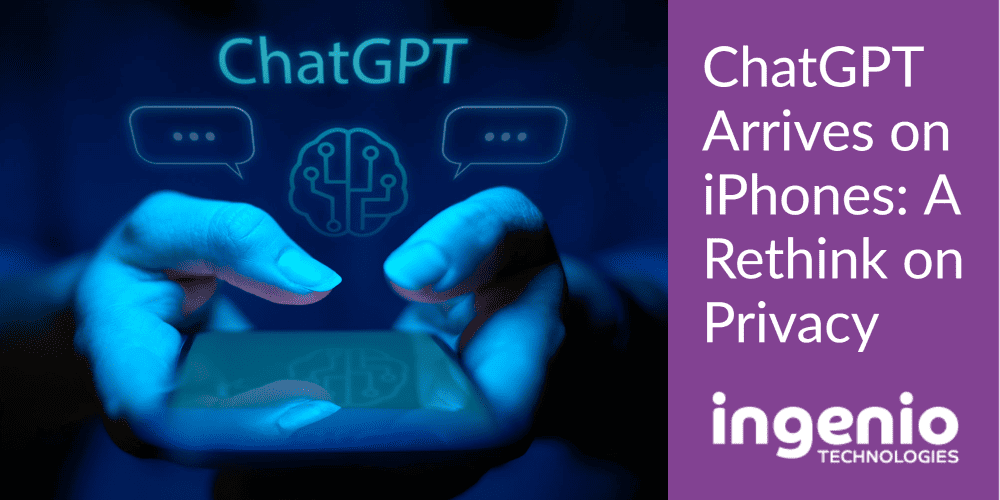ChatGPT Arrives on iPhones: A Rethink on Privacy
As pioneers in information technology, we at Ingenio Technologies are well-versed in the rapid developments and evolving privacy concerns related to Artificial Intelligence (AI).
This blog is a response to recent reports about OpenAI’s language model, ChatGPT, arriving on the Apple App Store and the resulting privacy concerns raised by experts and privacy advocates.
The Dawn of Generative AI Apps: Privacy Trade-offs
Generative AI applications such as ChatGPT offer the allure of highly interactive and intuitive interfaces. However, as echoed by Muskaan Saxena in
Tech Radar, they also present potential threats to user privacy. Users should proceed with caution before revealing sensitive information to AI.
The ChatGPT iOS app anonymises user chats, which implies that chats are stripped of data that could link back to users. Yet, according to Joey Stanford, VP of Privacy and Security at Platform.sh, this anonymisation may not be enough to protect privacy. He suggests that even anonymised data could be combined with other information to re-identify users.
Privacy Concerns and Responsibilities
OpenAI has stated that they take privacy very seriously, implementing measures to safeguard user data. However, despite these measures, vulnerabilities may exist. James McQuiggan, a security awareness advocate, reminds us that protecting your privacy is a shared responsibility between users and the data-collecting companies.
Generative AI applications might expose sensitive user information. Users have been known to input sensitive data, such as birthdays and phone numbers, into these AI systems. If these systems are not adequately secured, they can be vulnerable to unauthorised third-party access, potentially leading to identity theft or targeted advertising.
The Difference between Mobile and Desktop
On the positive side, mobile phones tend to have built-in security features that could help protect against privacy breaches by apps. However, these measures, while helpful, may not provide complete protection. As McQuiggan highlights, application permissions and privacy settings can only go so far in guarding personal information.
The data handling practices may vary between OpenAI’s desktop and mobile versions. For instance, Jen Caltrider of Mozilla’s Privacy Not Included project highlights that while users can opt-out of their chat data being used for improvement on the ChatGPT website, this feature does not exist on the iOS app.
Trust but Verify
Another grey area is the reliability of privacy information provided in app stores. Both Google Play and the Apple App Store have been criticised for the reliability of their safety information. Thus, it’s crucial for users to conduct their own research about data safety, despite the difficulty of the task.
The Way Forward: Federal AI Privacy Law
Given the rapid proliferation of AI applications, it is vital for legislation to catch up. Hodan Omaar, a senior AI policy analyst, underscores the need for a federal data privacy law to ensure clear and uniform standards for all companies. This call for robust oversight and regulation in the AI field aligns with Ingenio Technologies’ commitment to data security and privacy.
At
Ingenio Technologies, we believe in striking the right balance between technological advancements and user privacy. We are committed to helping our clients navigate the complexities of technology with the right tools and knowledge to protect their data. Stay informed, stay safe!

